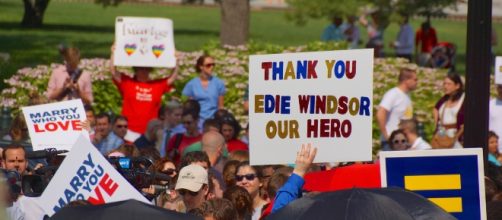Edith Windsor, plaintiff in the landmark 2013 U.S. Supreme Court Case, United States vs. Windsor, died Tuesday in New York. Windsor's case ultimately led to the legalization of same-sex marriage, a topic that affected her personal and proessional life. She began identifying herself as a lesbian in the 1950's, which allowed her to see the changing dynamic of the LGBT community over her lifetime.
DOMA
In 1996, President Bill Clinton enacted the Defense of Marriage Act (DOMA). It explicitly denied homosexual couples the same rights and benefits of heterosexual couples, including joint tax returns and exemptions, and rights of inheritance.
DOMA also required states that banned state marriage to not recognize same-sex marriages that took place in other states, whether it was legal there or not. This was in place until Edith Windsor dismantled it in 2013 with her Supreme Court case.
A landmark case
In 2007, Windsor married her partner of 40 years, Thea Spyer, in Canada, because the marriage was illegal in the United States. They had been engaged since 1967. A documentary, Edie and Thea: A Very Long Engagement was filmed about the couple, and was released in 2010. Following Spyer's death in 2009, Windsor was ordered to pay $360,000 in estate taxes because her and Thea's marriage was not recognized in the States.
Windsor appealed, at the age of 81, and the Supreme Court agreed to hear her case.
"It's a very important case," she said in 2012 following the court's agreement to hear her case, "It's bigger than marriage, and I think marriage is major. I think if we win, the effect will be the beginning of the end of a stigma."
In June 2013, the justices ruled in favor of Windsor, 5-4. The Supreme Court decided that same-sex couples are entitled to the same rights and benefits of heterosexual couples.
The lesbian trailblazer
Her perserverance did not go unnoticed. Time magazine named her as a finalist for their Person of the Year Award in 2013, but she lost to Pope Francis. This was the same year she was named one of the most important Jewish people By Forward.
Throughout her life, Windsor fought for LGBTQ equality, and is associated with many civil rights organizations, such as the NYC LGBT Center, Marriage Equality USA, and Service and Advocacy for LGBT Elders (SAGE). In an interview with AP, she admitted that she did not think she would see the conversation about same-sex marriage, and she was wrong.


